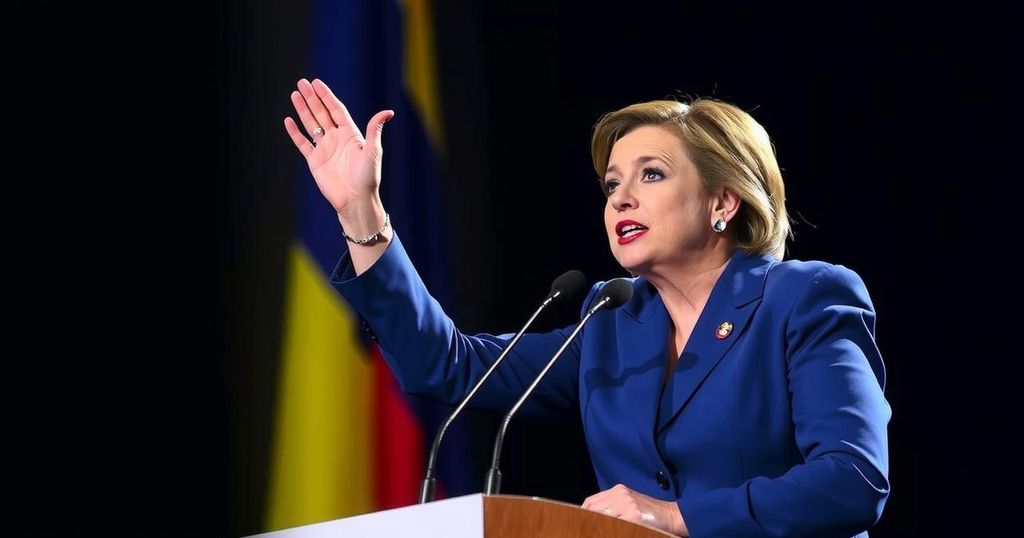World news
ALLIANCE FOR THE UNITY OF, ALLIANCE FOR THE UNITY OF ROMANIANS, ALLIANCE FOR UNITING ROMANIANS, ASIA, ATLANTIC, CALIN GEORGESCU, CENTRAL ELECTORAL BUREAU, CIOLACU, ELECTIONS, ELENA LASCONI, EUROPE, EUROPEAN UNION, FAR-RIGHT POLITICS, FRANCE, GEORGE SIMION, GERMANY, HAARETZ, ISRAEL, MINISTRY OF ENVIRONMENT, NATO, NORTH ATLANTIC ALLIANCE, OF ENVIRONMENT, PARLIAMENTARY ELECTIONS, POLITICS, POPULISM, ROMANIA, SAVE ROMANIA UNION, SAVE ROMANIA UNION PARTY, SOCIAL DEMOCRATIC PARTY, TI, TIKTOK, UK
Amira Khan
0 Comments
Hard-Right Populist Calin Georgescu Surges in Romania’s Presidential Election
Calin Georgescu, a hard-right populist, has surprisingly secured a lead in Romania’s presidential election, gaining 23 percent of the vote against Prime Minister Marcel Ciolacu’s 20 percent. Georgescu, who previously polled at around 5 percent, advocates for an end to aid for Ukraine and has criticized NATO’s presence in Romania. He is set to face Ciolacu in a run-off on December 8.
A surprising turn of events in Romania’s presidential election has been marked by the rise of hard-right populist Calin Georgescu, who defied prior expectations by securing nearly 23 percent of the votes, placing him ahead of Prime Minister Marcel Ciolacu’s 20 percent, according to partial results from the Central Electoral Bureau. This notable shift in the political landscape suggests a growing skepticism toward Romania’s pro-European stance. With the election still ongoing, Georgescu is positioned to face Ciolacu in a decisive run-off scheduled for December 8.
Georgescu’s ascent is particularly noteworthy considering he was polling at around 5 percent prior to the election. Running as an independent candidate with an emphasis on social media outreach, particularly through TikTok, he has generated significant interest among voters, even as traditional media largely overlooked his campaign. His controversial views include criticism of NATO and the EU, as well as advocating for a cessation of aid to Ukraine, amidst its ongoing conflict with Russia.
Amidst a backdrop of economic concerns, Georgescu’s platform appears to resonate with voters yearning for a shift in leadership, as evidenced by his comments post-victory, suggesting that the electorate has “cried out for peace.” Additionally, his past statements, which include treating Ion Antonescu, Romania’s WWII leader aligned with Hitler, as a national hero, have sparked debate and controversy regarding historical memory in Romania.
The political climate in Romania is further complicated by its significant geographical proximity to the ongoing crisis in Ukraine, sharing a 650km-long border. Romania has been a firm ally of Ukraine, offering military support as well as hosting NATO defenses. Thus, the implications of Georgescu’s potential presidency could not only alter the national political scene but may also affect Romania’s role in regional security and alliances.
The context surrounding Romania’s widespread political dynamics includes its membership in both the European Union and NATO. Historically, Romania has maintained a pro-Western foreign policy stance, prioritizing partnerships with Western institutions. However, contemporary issues, including economic distress and rising living costs, have fomented a populist reaction among the electorate. In recent years, populist sentiments have gained traction across Europe, reflecting a broader skepticism toward globalist frameworks such as the EU and NATO.
The emergence of Calin Georgescu as a leading candidate in Romania’s presidential election signifies a dramatic shift in the country’s political landscape, as citizens grapple with economic challenges and foreign policy stances in light of regional conflicts. His controversial platform, rooted in nationalism and skepticism towards international alliances, highlights a growing discontent with traditional political narratives and will be pivotal in shaping Romania’s future direction, especially regarding its relationship with NATO and the EU.
Original Source: www.aljazeera.com




Post Comment